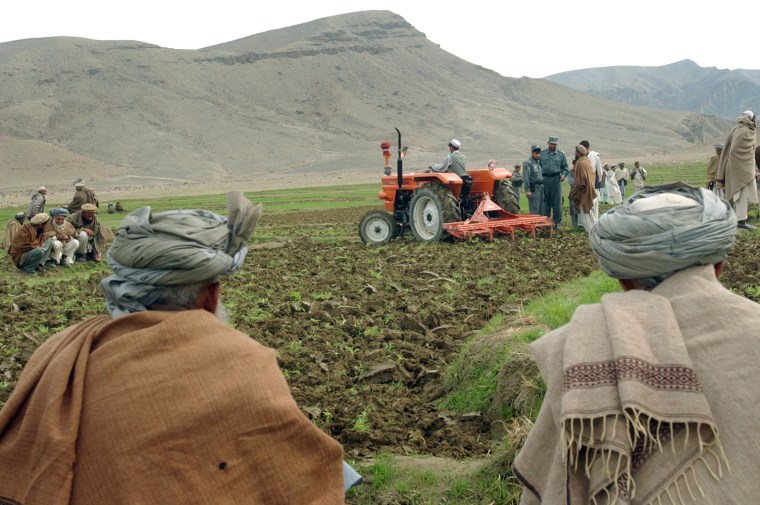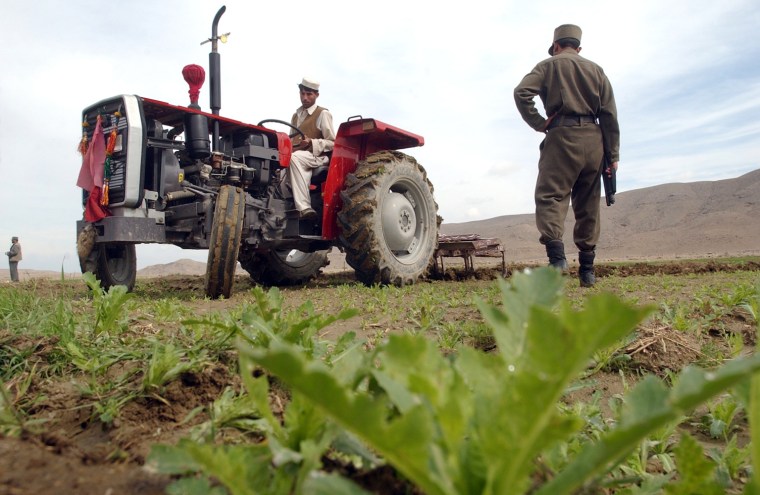Anguish creased the weathered face of the opium farmer as a U.S.-trained eradication team swept through his farm fields in this southern Afghan village.
With helicopters buzzing overhead, dozens of tractors plowed up Sadullah Khan's sprouting poppy plants, which in two months time would have yielded the sticky resin used to make heroin — and earned him, by Afghan standards, a generous income.
After failing miserably to curb opium production last year, the Afghan government has launched a renewed eradication drive, particularly here in Helmand province — which accounted for more than 40 percent of the 2006's record yield of 6,725 tons. The U.S. government estimates the opium trade generates $3 billion a year in illicit economic activity.
There is some armed resistance to the campaign in Helmand, where drug gangs and Taliban militants form a powerful nexus against President Hamid Karzai's unpopular government. Still, counter-narcotics officials expect better results this year — if not a resounding success.
That's cold comfort to Khan, a 55-year old father of nine, who owns 25 acres of land planted with poppies.
"When they are eradicating my poppy, it's just like they are destroying my home," he said, watching the heavily armed Afghan teams at work — supported by a handful of U.S. contractors, who rode in pairs through the rolling poppy fields on all-terrain vehicles.
There are fears the program could increase support for Taliban insurgents, but Karzai is under growing international pressure to crack down on Afghan drug production — which accounts for more than 90 percent of global supply.
Bush's public reminder
Last week, President Bush called poppy cultivation a threat to Afghanistan's fragile democracy. Bush said he had told Karzai "to gain the confidence of his people, and the confidence of the world, he's got to do something about it, with our help."
The year 2006 saw an alarming 59 percent rise in opium cultivation to 407,700 acres, deepening fears that Afghanistan is rapidly becoming a narco-state.
A Western counter-narcotics official said it was too early for an accurate prediction of this year's crop, but he noted some positive signs.
Cultivation will likely drop significantly in the north and northeast while increasing slightly in some areas of the south, said the official, who spoke on condition of anonymity because of the sensitivity of the issue.

The government, he said, has launched eradication "earlier and with more determination" than last year and has warned officials they would be fired if they didn't take action.
Lt. Gen. Mohammed Daoud Daoud, the deputy interior minister for counter-narcotics, said 8,900 acres of poppy fields have been destroyed nationwide in the past month. The target is to destroy almost 14 times that figure — a total of 123,550 acres — before the harvest, which runs from April to July, from the south to the colder north.
The Western official doubted that target will be reached. But he said he hoped that 15 to 20 percent of the planted fields will be eradicated to demonstrate the "business risk" to poppy growers. Last year, only about 8 percent of planted fields were destroyed.
Helping Taliban recruit?
The campaign, supported mainly by the U.S. and Britain, carries a political and military risk for the government and its Western allies. It could generate more recruits for the Taliban, the militia that is threatening a spring offensive against NATO forces.
There have been five attacks in the past two weeks against the eradication campaign in Helmand, Farah and Nangarhar provinces, Daoud said. In the worst incident, a roadside bomb in Helmand's Nad Ali district killed two police officers and wounded three serving as guards for the eradication team.
To mitigate the risk of a backlash by farmers, authorities say they are targeting areas where there's little reason not to grow crops like wheat and vegetables _ rather than dry, remote fields where farmers may feel forced to cultivate opium because they lack good irrigation or market access.
Most eradication efforts are led by provincial governors who pay their teams with U.S. money. But there's also a well-equipped, 550-man national eradication force under the Ministry of Interior, which is advised by the U.S. security contractor Dyncorp.
This force has deployed to areas with increased poppy cultivation — in Nad Ali, for example, where vast poppy fields are irrigated by canals fed by the Helmand River.
This week, angry farmers in Dobundi village watched as uniformed men on tractors plowed up foot-tall poppy plants. Counter-narcotics officials say the farmers should have time to replant with legal crops.
In other villages, farmers have flooded fields to obstruct the tractors. Dobundi's farmers put up no resistance, but they complained bitterly, alleging security forces targeted them because the area is less dangerous than elsewhere in Helmand.
"If the Taliban were in Nad Ali, the government couldn't come here," said one farmer, Darath Khan.
He said Karzai's government had failed to bring security or development, despite the foreign aid that has poured into Afghanistan over the past five years.
Sadullah Khan spoke for many farmers when he described his dilemma. "I know it's not good to cultivate poppy but we don't have any other option," he said. "If we can't cultivate it, we can't feed our families."
He said his poppy crop earns him four times what a crop of wheat would.
If Sadullah Khan were allowed to harvest his poppies, his 25 acres would likely yield about 815 pounds of opium, which would fetch about $37,000 at market, the counter-narcotics official said.
Still, Sadullah Khan owns a relatively large farm in one of the best-irrigated and fertile regions in the country. By planting wheat he could, by his estimate, earn roughly $9,250 — a good income in rural Afghanistan.
